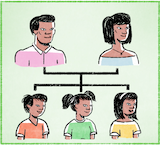
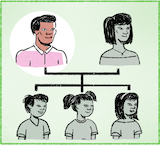
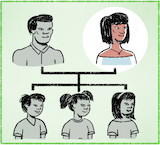
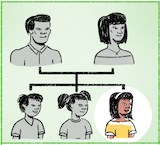
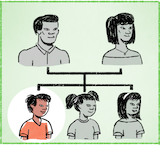
นี้คืออี่หยัง นี้คือแผนผังคอบคัว หลือเป็นคอบคัวนั้นหละ
คอบคัวนี้ใหญ่ คอบคัวบักใหญ่หนึ่ง มีสะมาชิกในคอบคัวกะหลายคนเติบอยู่
คอบคัวนี้มีพุใดแน่ กะมีพ่อ แล้วกะมีแม่ แล้วกะมีน้องสาว มีน้องซาย แล้วกะมีพี่สาวพ้อม
คนเป็นพ่อกับแม่นี้ มีลูกเทิงเบิดสามคน เป็นพุหญิงสองคน เป็นพุซายพุหนึ่ง
17
พุซายคนนี้คือพุใด พุซายคนนี้คือพ่อ
เป็นพ่อของลูกเทิงสามคนนี้ เป็นพ่อของลูกของเด็กน้อยเทิงสามคนนี้
คนเป็นพ่อสิเป็นพุซาย หลือเป็นผัวของพุหญิงคนนี้หละ หลือเป็นผัวของคนที่เป็นแม่ของลูกคนนี้
18
พุหญิงคนนี้คือพุใด พุหญิงคนนี้คือเป็นแม่
เป็นเมียของพุซายคนที่เป็นพ่อของคนนี้หละ
พุหญิงคนนี้กะเป็นแม่ของเด็กน้อยสามคนนี้
หลือเป็นเมียของพุซายคนนี้หละ
พุหญิงคนนี้กะเบิ่งแล้วกะงามอยู่ ใส่เสี้ยเกาะอกสีฟ้า ใส่ส้อยพ้อม ผมกะสั้นๆ ผมบ่ญาวหลาย
19
พุหญิงคนนี้เป็นพุใด พุหญิงคนนี้เป็นลูกของพ่อกับแม่นี้
พุหญิงคนนี้เป็นพี่สาวของเด็กน้อยคนนี้พ้อม
พุหญิงคนนี้เป็นพี่สาวใหญ่ หลือเป็นลูกกกนั้นหละ เป็นลูกพุใหญ่สุด
ใส่เสี้ยสีเหลียง ใส่เสี้ยแขนสั้นสีเหลียง
ผมกะค้ายๆ กับแม่ เฮ็ดซงผมคือๆ กันกับแม่นั้นหละ ผมบ่ญาวหลาย ผมบ่สั้นหลาย
คนอี่สานเอิ้นว่า เป็นลูกคนกก หลือเป็นลูกคนต้นหมู่นั้นหละ
20
แล้วพุซายคนนี้เป็นใผ พุซายคนนี้กะเป็นลูกซายของพ่อกับแม่คือกัน
เป็นลูกคนสุดท้อง เป็นลูกปายนั้นหละ เป็นลูกหล้าหมู่ เป็นเด็กน้อยกว่าหมู่ เป็นน้องซายของพุหญิงสองคนนี้พ้อม
เขาใส่เสี้ยสีแดง ใส่เสี้ยแขนสั้นสีแดง
ผมกะสั้นๆ ผมบ่ญาวหลาย เบิ่งแล้วกะเป็นตาฮักอยู่ บ่เป็นตาพุฮ้ายดอก
Link to overview page
Link to dictionary
| Isaan | Pronunciation | Tones | Thai | English/Notes |
|---|---|---|---|---|
| นี้ | ni: | HF | นี้ | 1. this 2. here |
| คือ | khʉ: | HR | คือ | 1. to be, to resemble, like, as 2. why {บักหล้าคือบ่เก็บโต่ะแน่ = [addressing a young boy] Why haven't you cleared the table?} |
| อี่หยัง | i:-yaŋ | H-M | อะไร | 1. what {นี้คืออี่หยัง = What is this?} {มื้อนี้เจ้าเฮ็ดอี่หยัง = What are you doing today?} {กินเข้างายกับอี่หยัง = What did you have for breakfast?} 2. something, anything, (in negations) nothing {บ่ต้องเฮ็ดอี่หยังอีกเลยนอกจากใส่ปุย = [we] don't need to do anything besides adding fertilizer} |
| แผนผัง | phɛ:n-phaŋ | M-M | แผนผัง | diagram, layout, scheme |
| คอบคัว | khɔ:p-khu:a | HF-HR | ครอบครัว | family |
| หลือ | lʉ: | M | หรือ | or |
| เป็น | pen | M | เป็น | 1. to be, to exist 2. to be able to 3. to suffer, sth. happens to 4. เป็นหญัง[...]คือ in initial position: why? {เป็นหญังเขากะคือแปงฟัน = Why is he brushing his teeth?} {เป็นหญังเคี่ยงบินมันคือสิตก = Why is the airplane falling down?} |
| นั้นหละ | nan-la | HF-M | นั่นแหละ | auxiliary for emphasis at the end of a phrase |
| ใหญ่ | ɲai | H | ใหญ่ | large, big |
| บัก | bak | M | 1. intensifier before adjectives {ปาโตบักใหญ่ = a (very) large fish} 2. prefix in front of fruits and vegetables {บักแตงโม = watermelon} 3. can be used as a reference for a male person of the same or younger age {บักอันนี้ = this lad} |
|
| หนึ่ง | nʉŋ | H | หนึ่ง | 1. one 2. after adjective: intensifier {บักคักหนึ่ง = very much} {อันบักใหญ่หนึ่ง = very large}, or attenuates the meaning {กะดาดมันแผ่นน้อยๆ หนึ่ง = the piece of paper is [relatively] small} |
| มี | mi: | HR | มี | 1. to have 2. there is |
| สะมาชิก | sa-ma:-chik | M-HR-H | สมาชิก | member |
| ใน | nai | HR | ใน | in, within |
| กะ | ga | M | ก็ | 1. then, consequently 2. also |
| หลาย | la:i | M | เยอะ, มาก | many, much, very |
| คน | khon | HR | คน | person, people |
| เติบ | tə:p | LF | intensifier: very, much {เว้ากันโดนเติบ = to talk a long time} | |
| อยู่ | yu: | H | อยู่ | 1. to be (located) at 2. yet, still 3. auxiliary indicating continuous or progressive action {ทอดปาอยู่ในกะทะ = (in the process of) frying a fish in the pan} {แม่กำลังเมี้ยนเฮียนอยู่ = mother is cleaning/tidying up the house} |
| พุใด | phu-dai | H-M | ใคร | 1. who {มีพุใดโทมากะบ่ลู้ = I don't know who has called} {ห้องนอนของพุใด = whose bedroom (is this)? } 2. someone, somebody, anybody, in negative context: nobody {บ่มีพุใดอยู่กับเขาเลย = there's nobody with him} |
| แน่ | nɛ: | H | แน่, บ้าง | 1. some, somewhat 2. final particle, used to ask for examples (similar to Thai บ้าง at the end of a question) {หม้อใซ้เฮ็ดอี่หยังได้แน่ = What (different things) can a pot be used for?} {น้ำอัดลมซื้อได้อยู่ใสแน่ = Where/in which places can one buy soft drinks?} 3. final particle, when giving examples {มีเทิงส้งแน่ มีเสี้ยแน่ มีเกิบแน่ = there are trousers, shirts, shoes etc.} 4. final particle, used to give a command {ไปปิดหน้าต่างให้แน่ = Close the window!} 5. final particle, acting as an intensifier, especially in the pattern ... คัก ... แน่ {สูงคักสูงแน่ = very high} {ญ้องเฮาคัก ญ้องเฮาแน่ = [he's] praising me a lot} |
| พ่อ | phɔ: | H | พ่อ | father |
| แล้ว | lɛ:o | HF | แล้ว | 1. finished 2. already 3. and then, and next (especially แล้วกะ) 4. auxiliary for past tense |
| แม่ | mɛ: | H | แม่ | mother |
| น้องสาว | nɔ:ŋ-sa:o | HF-M | น้องสาว | younger sister |
| น้องซาย | nɔ:ŋ-sa:i | HF-HR | น้องชาย | younger brother |
| พี่สาว | phi:-sa:o | H-M | พี่สาว | elder sister |
| พ้อม | phɔ:m | HF | พร้อม | at the same time, also, too {มีตะเว็นพ้อม = the sun's out, too} {กะทะมีด้ามพ้อม = the pan has also a handle} |
| กับ | gap | M | กับ | 1. and {ลุงกับป้า = uncle and aunt} {กวยเตียวหมูกับกวยเตียวไก่ = noodle soup with pork and noodle soup with chicken} 2. with, to {ค้ายๆ กับคำว่า ... = similar to the word ...} 3. prefix in front of foods {กับเข้า = side dishes eaten with rice} {เขากินกับกวยเตียว = he's eating noodle soup} |
| ลูก | lu:k | HF | ลูก | 1. child 2. clf. for balls, fruits (lime), mountains |
| เทิงเบิด | thə:ŋ-bət | HR-M | ทั้งหมด | all, all of them, in total {มีลูกเทิงเบิดสามคน = there are three children in total} {เขาเป็นพุหญิงเทิงเบิด = they are all girls} Notes: pronunciation: also realized as ทังเบิด |
| สาม | sa:m | M | สาม | three |
| พุหญิง | phu-ɲiŋ | H-M | ผู้หญิง | woman, female |
| สอง | sɔ:ŋ | M | สอง | two |
| พุซาย | phu-sa:i | H-HR | ผู้ชาย | man, male |
| พุ | phu | H | ผู้ | 1. person 2. clf. for people {พุหญิงพุหนึ่ง พุซายพุหนึ่ง = a woman, a man} {ซู่พุซู่คน = everybody} {พุหนึ่งโตจ่อยๆ พุหนึ่งโตบักอ้วนหนึ่ง = one person is slim, the other is fat} Notes: pronunciation: also realized as พู่- |
| ของ | khɔ:ŋ | M | ของ | of, belonging to |
| เทิง | thə:ŋ | HR | ทั้ง | 1. up to, all, all of, the whole of, altogether {เขาใส่กางเกงขาสั้นเทิงสองคน = both are wearing short trousers} {เขาเป็นพ่อของลูกเทิงสามคนนี้ = he's the father of these three [children] here} 2. เทิง ... เทิง ...: both ... and ..., ... as well as ... {เทิงมีใบพ้อม เทิงมีเหลียนพ้อม = there are notes as well as coins} Notes: pronunciation: also realized as ทัง |
| เด็กน้อย | dek-nɔ:i | M-HF | เด็ก, เด็กน้อย | child |
| สิ | si | M | จะ | future tense auxiliary {เขากำลังสิตื่น = he's about to wake up} {สิไปตะหลาด = [I'm] going to the market} |
| ผัว | phu:a | M | ผัว | husband |
| นี้หละ | ni:-la | HF-M | นี่แหละ | auxiliary for emphasis at the end of a phrase |
| ที่ | thi: | H | ที่ | 1. that, which {คนที่ยืนอยู่ฝั่งขวา = the person which is standing on the right = the person standing on the right} {เว้าคำที่บ่สุพาบ = to speak words which are impolite = to speak impolitely} 2. for ordinal numbers {ที่สาม = third} |
| เมีย | mi:a | HR | เมีย | wife |
| เบิ่ง | bəŋ | H | ดู | 1. to look at, to see, to watch {เบิ่งโทละทัด = to watch TV} {เบิ่งหนัง = to watch a movie} 2. to guess {เบิ่งซงแล้ว ... = [I] guess / from what it looks like ...} |
| งาม | ŋa:m | HR | สวย | beautiful, handsome, splendid |
| ใส่ | sai | H | ใส่ | 1. to put something in/on {เขาใส่บักพิกในกวยเตียวหลาย = he's putting a lot of chili in his noodle soup} {เขาบีบยาสีฟันใส่แปงสีฟัน = he squeezes toothpaste on the toothbrush} {ก่องเอาไว้ใส่ของ = boxes are there to put stuff in} 2. to wear (clothes) {เขาใส่เสี้ยแขนญาว = he's wearing a long-sleeve} 3. directed at {เอิ้นใส่กัน = to call each other/to say to each other} {หมามันเห่าใส่แมว = the dog barks at the cat} {ล้องเพงใส่ไม = to sing into the microphone} {เขากำลังซี้มือไปใส่พุซาย = she's pointing at the man} |
| เสี้ยเกาะอก | si:a-gɔ-ok | LF-M-M | เสื้อเกาะอก | tube top (shoulderless women's garment) |
| สี | si: | M | สี | 1. color 2. colored pencil, crayon |
| ฟ้า | fa: | HF | ฟ้า | 1. sky {เคี่ยงบินมันกำลังบินขึ้นฟ้า = the airplane is taking off into the sky} 2. color: blue |
| ส้อย | sɔ:i | LF | สร้อย | necklace |
| ผม | phom | M | ผม | hair |
| สั้น | san | LF | สั้น | short |
| บ่ | bɔ: | H | ไม่ | 1. no, not 2. question particle, transforming a statement into a question Notes: spelling exception in line with common usage on social media |
| ญาว | ɲa:o | HR | ยาว | long |
| ลูกกก | lu:k-gok | HF-M | ลูกกก | first child |
| พุใหญ่ | phu-ɲai | H-H | ผู้ใหญ่ | adult, elder |
| สุด | sut | M | สุด | last, extreme, most |
| เสี้ย | si:a | LF | เสื้อ | shirt |
| เหลียง | li:aŋ | M | เหลือง | yellow |
| แขน | khɛ:n | M | แขน | arm |
| ค้าย | kha:i | HF | คล้าย | to resemble, to be similar, to be alike {ทัพพีเป็นค้ายๆ กับซ้อน = a ladle is similar to a spoon} |
| เฮ็ด | het | H | ทำ | to do, to make |
| ซงผม | soŋ-phom | HR-M | ทรงผม | hairstyle, hairdo |
| กัน | gan | M | กัน | mutual, each other, with another, together {เขากำลังนั่งเว้ากัน = they're sitting and talking} {เขาสองคนฮักกัน = they love each other} {ปาสองโตนี้ ใหญ่ห่างกันหลายบ่ = These two fish here, are they very different in size (from each other)?} {ต่างกัน = to be different (from each other)} {ก่องอันไหนหนักกว่ากัน = Which box is heavier (than the other(s))?} |
| อี่สาน | i:-sa:n | H-M | อีสาน | Isaan {คนอี่สาน = Isaan person} |
| เอิ้น | ə:n | HF | พูด, เรียก | to call, to say {เอิ้นง่ายๆ ว่า = in other words} {คนอี่สานเอิ้นว่า เป็นลูกคนกก = Isaan people call her ลูกคนกก} |
| ว่า | wa: | H | ว่า | 1. that, as {คำว่า X = the word X} 2. to say |
| กก | gok | M | ต้นไม้ | 1. tree 2. first child {ลูกคนกก = first child} 3. base, foot, bottom {ตงกกต้นก้า = at the stem/bottom/lower part of the rice seedling} |
| ต้น | ton | HF | ต้น | 1. clf. for trees, plants, logs/pieces of wood {ต้นไม้ต้นใหญ่ = a large tree} {ต้นฟืน = log/piece of wood} 2. first, primary, initial {ลูกคนต้นหมู่ = first child} |
| หมู่ | mu: | H | หมู่, กลุ่ม(เพื่อน) | 1. group, friend(s) 2. children (in a family) {ลูกคนที่ออกมาก่อนหมู่ = the first-born child} {น้องสุดหมู่ = last-born child} 3. collective noun: group, many |
| ใผ | phai | M | ใคร | 1. who {พุซายคนนี้เป็นใผ = Who's this boy?} 2. somebody, someone, anybody, with negative: nobody {บ่มีใผอยู่หนี้จักคนเลย = there's not a single person here} |
| ลูกซาย | lu:k-sa:i | HF-HR | ลูกชาย | son |
| คือกัน | khʉ:-gan | HR-M | เหมือนกัน | 1. also, likewise, similarly {ยินดีที่ได้ฮู้จักคือกันคับ = Nice to meet you too!} 2. in negative sentences: either {บ่ลู้คือกัน = I don't know either} {จักคือกัน = I don't know (either)} |
| สุดท้อง | sut-thɔ:ŋ | M-HF | สุดท้อง | of children: youngest |
| ปาย | pa:i | M | ปลาย | 1. tip, end, extremity {ปายพูเขา = summit of a mountain} 2. of children: youngest {ลูกสาวคนปาย = youngest daughter} |
| หล้า | la: | LF | 1. used to adress someone younger 2. last {ลูกหล้าหมู่ = youngest child} |
|
| กว่า | gwa: | H | กว่า | more, more than, comparative: as, than |
| เขา | khao | M | เขา | personal pronoun: he, she |
| แดง | dɛ:ŋ | M | แดง | red |
| ตาฮัก | ta:-hak | M-H | น่ารัก | cute, lovely |
| ตาพุฮ้าย | ta:-phu-ha:i | M-H-HF | หน้าตาขี้เหร่ | ugly, unattractive |
| ดอก | dɔ:k | LF | หรอก, ดอก | 1. particle used after a negative, relativizing or explanatory statement to make the sense milder {กินเข้าบ่ บ่กินดอก = Are you going to eat [with us]? No.} {เป็นก้อนสี่เหลี่ยม ก้อนน้อยๆ ดอก = These are cubes, small cubes.} {แล้วกะมีลดคันหนึ่งขี่ผ่านมา เป็นลดเก็งดอก = And there's a car passing, a sedan.} 2. particle used to emphasize (not necessarily a negative) contrast 3. particle used for emphasis {ดอกไม้นี้งามบ่ กะงามอยู่ เบิ่งงามๆ ดอก = Is this flower beautiful? Yes, it's beautiful, it looks beautiful} |